Flat Jane in Providence:
In which Jane continues to learn about the early history of Rhode Island
editor's note: A visit to the Rhode Island Charter Museum in the State House
May, 18--
Dearest friends,
I continue my exploration of the early history of this "lively experiment".
In fall 1636 Roger Williams drew up what he referred to as "a civil compact." It was adopted at a town meeting on 20 August 1637. The document states the government shall have authority over civil things, allowing for liberty of conscience and religious tolerance. This is the first time in America church was separated from state. 'Tis quite different from England where our king is head of the church.
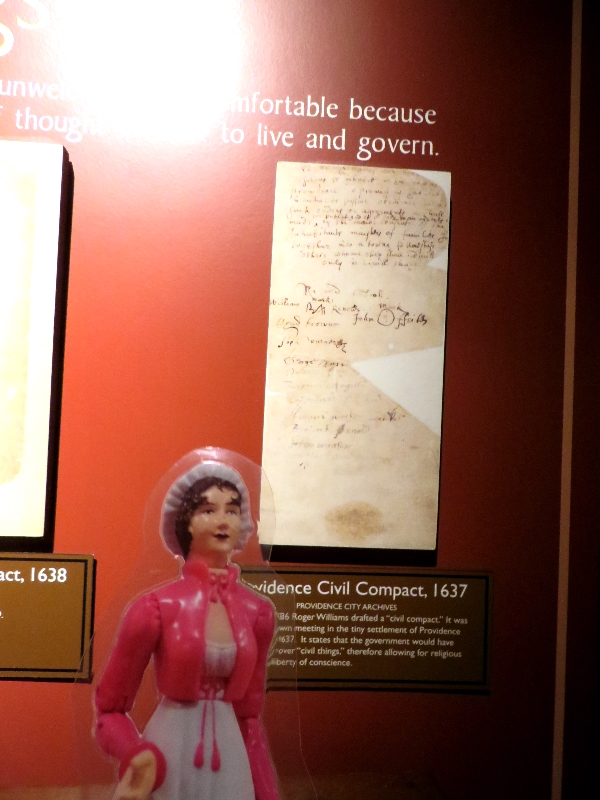 |
| Providence Civil Compact 1637 |
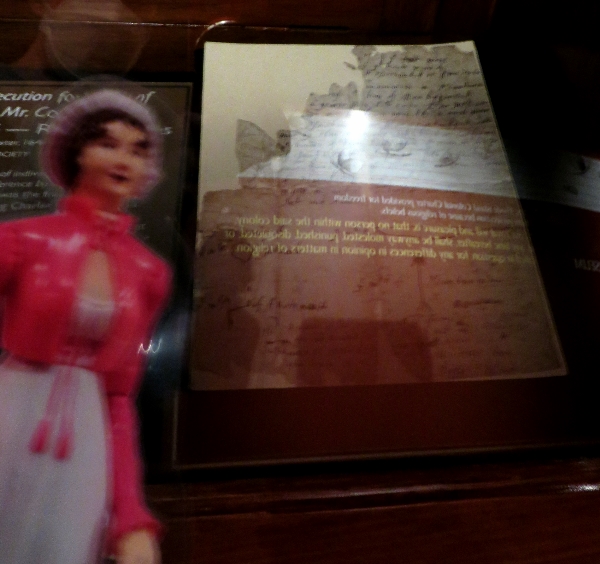 |
A fragment of the original deed of Providence
|
'Tis a scrap of paper, really, but quite important to the history of this town- the original land deed of 1638 signed by Roger Williams, Canonicus and Miantonomo. The sachems drew their "signatures" with in the symbols of a bow and an arrow. This document confirms earlier verbal and written agreements between the parties.
The new colony attracted people of diverse opinions and lifestyles! Truly I have never seen so many dissenting churches in one place. Later I shall attempt to sketch some for you. The colony was also home to Jews, Mohammedans (Muslims), Native religions and even NO religion at all!
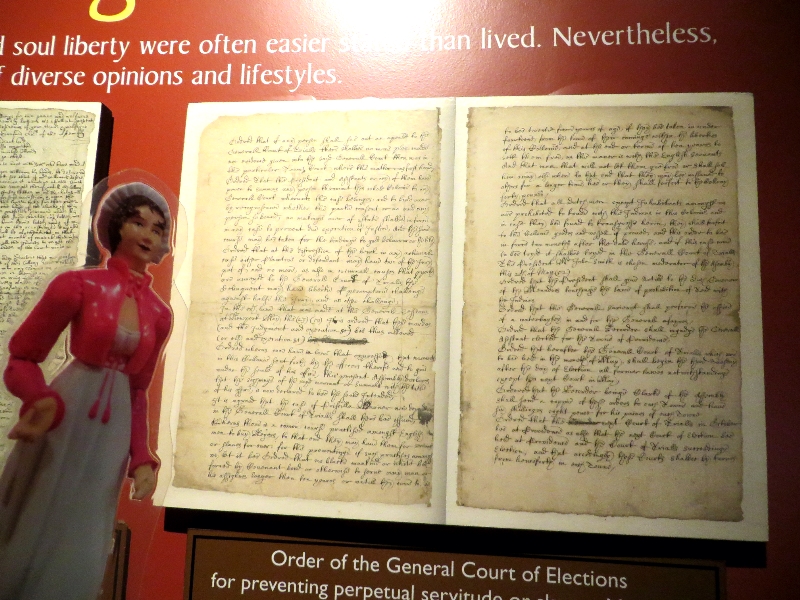 |
Order of the General Court of Elections for preventing
perpetual servitude or slavery, May 1652 |
In 1652 Rhode Island passed the first law prohibiting indentured servitude after 10 years limit and slavery. The law also said children indentured prior to the age of 14 should be freed at the age of 24. was, alas, not enforced due to Rhode Island being coastal. Rhode Island became the centre of the Triangular Trade, shipping rum to Africa in exchange for slaves and slaves to the West Indies to harvest sugarcane used in making rum here in Rhode Island. Mr. John Brown, his brothers and others like them participated in this insidious trade. (Yes I am aware of where we obtain the sugar for our tea. )
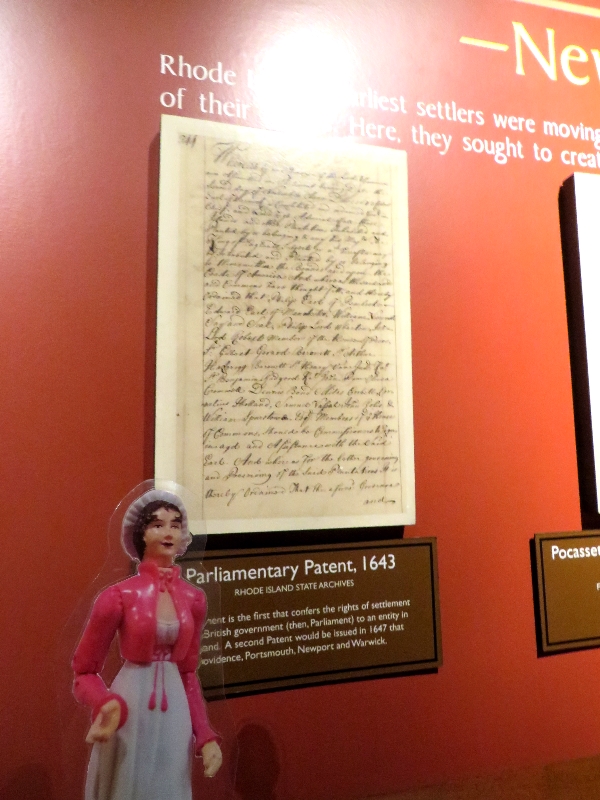 |
| Jane and the Parliamentary Patent of 1643 |
While that dreadful Cromwell and the Puritans were in charge during the Civil War, Rhode Island was governed by a patent from Parliament granted in 1643. Roger Williams risked his life to travel back to England to obtain this document. Under this patent, the new settlements of Providence, Portsmouth and Newport were united and named “the incorporation of Providence Plantations in Narragansett Bay in New England.” The patent prevented encroachment from neighboring colonies (tho' I am told Massachusetts and Connecticut both tried to incorporate parts of land claimed by Rhode Island). The patent also provided for self-government, and focused on civil laws. 'Twas the first document that conferred the right to settle here from Parliament. Parliament granted another patent in 1647 incorporating the new town of Warwick. At least the Cromwellians managed to do something good, at least for this colony at any rate.
Editor's Note: Read a transcription or view the original document
In 1653, dissenters in Newport were discontent. Newport, on the island that gives the state its' name, along with the town of Portsmouth and smaller neighboring island of Conanicut (Jamestown) were then under a separate government with a separate governor. Governor Coddington had obtained a commission in 1649 naming him governor and without a provision for elections, Mr. Coddington was governor for life. He lied to Parliament to obtain this commission. Coddington's commission annulled Roger Williams's 1644 charter.
The dissenters in Newport and Warwick felt a keen lack of support from their governor and encouraged Dr. John Clarke of Newport; Roger Williams of Providence; and William Dyer, of Portsmouth, to sail to England to get Parliament to revoke Coddington’s commission and affirm the 1644 charter. The dissenters wanted to protect their way of life as growing threats to their religious freedom from Massachusetts and Connecticut colonies.
John Clarke, a Baptist minister from Newport and Roger Williams traveled to London in 1652 to secure a new charter. Roger Williams returned two years later but John Clarke stayed behind for 12 years, pressuring Parliament and then King Charles II for a charter. In 1663 good King Charles agreed to grant the charter. On July 6, 1663 King Charles II added his royal seal of approval.
 |
Jane learns about the Royal Charter of 1663
|
John Clarke's charter of 1663 guaranteed freedoms of speech, religion and other liberties to residents of Providence, Portsmouth, Newport and Warwick.
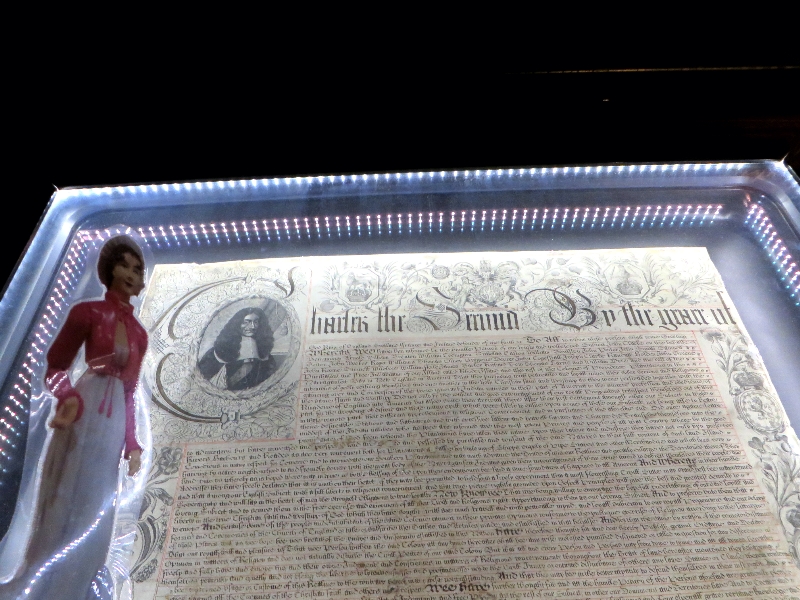 |
| Jane and the Royal Charter of 1663. It is too large for one case. |
“Our royal will and pleasure is that no person within the said colony at any time hereafter shall be anyway molested, punished, disquieted or called in question, for any differences in opinion in matters of religion.”
Once again I have much to contemplate. I must leave off now for the night for the hour grows late and my candle is burned low. I do have much more to tell you though so I shall write more tomorrow.
Yours,
J.A.









No comments:
Post a Comment